
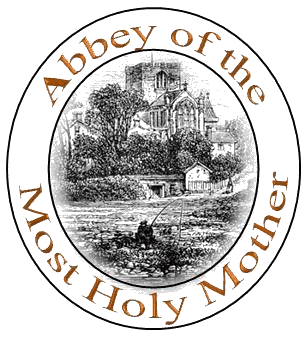

Abbey of the Most Holy Mother
870-206-0160
870-206-0160
© 2012 - 17 Abbey of the Most Holy Mother
Early Christian houses of worship were small and simple places were Christian families and others would gather to learn the teachings of Jesus.
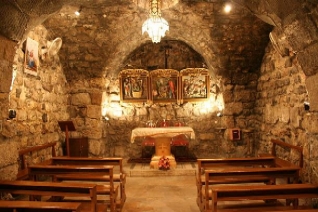
Frescos such as this one, from the late 1st century, showing only women sitting a a table celebrating the Eucharist have been found in locations such as the Catacombs of Priscilla located under Rome’s Via Salaria.
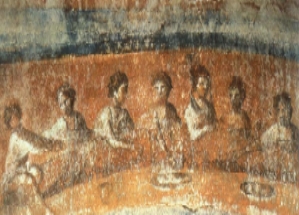
Early Christian home in the city of Jerusalem. Homes like these were were early Christians would gather to share the teachings of Jesus. Women play a pivotal role in the growth of the original church being both teacher and nurturer to the christian community.
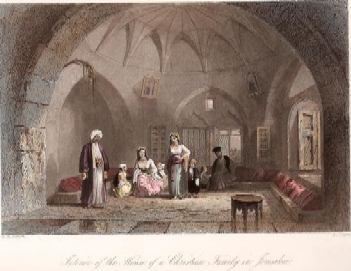
In the Catacombs of Priscilla located under Rome’s Via Salaria there are many frescos from the first through the fifth century that show women Christian priests/apostles ministering to small groups of Christians in various church and outdoor settings.
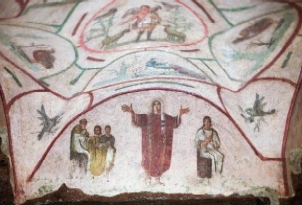
Our Ministries
Abbey Worship Services
For where two or three are gathered together in my name, there am I in the midst of them.
Matthew 18:20
For where two or three are gathered together in my name, there am I in the midst of them.
Matthew 18:20
The Abbot's Chapel
The Abbot's Chapel is where the Abbot holds his Mass at designated times. At other
times the chapel is open for meditation and contemplation as well as small prayer and study
group meetings. Masses are generally held using traditional Christian rituals derived from
well-known and established Catholic and/or Anglican liturgies. The degree of formality of
the services will vary depending on the time of day and abbey designated activities of the
day. Remembering and giving thanks for the bountiful blessing of this life should not be
restricted because of attire. At morning or other daily prayer you may see the Abbot or
other clergy dressed in a variety of attire from clerical shirts while holding informal prayers
or while at a celebration of High Mass the clergy will be in albs, a designated clerical habits,
or the designated tunic and scapular signifying the celebrants as members of the holy order.
Because brothers and sisters of the abbey actually live their Christian worship every day,
worship services in the Abbot's chapel are as unique an experience as the everyday Christian
life that the members live.
Our Sacraments Include:
Baptism - We believe, the Sacrament of Baptism is the first step in a lifelong journey of
commitment and discipleship. Whether we are baptized as infants or adults, Baptism is
the Church's way of celebrating and enacting the embrace of Holy Spirit.
Eucharist - We believe the Eucharist, or Communion, is both a sacred and nurturing
meal. We believe in the real presence of Holy Spirit during the Eucharist, and that during
this remembrance of the sacrifices for us we are brought closer to the Holy Spirit.
Reconciliation - The Sacrament of Reconciliation (also known as Penance, or Penance
and Reconciliation) has three elements: conversion, confession and celebration. In it we
find the Holy Spirit's unconditional forgiveness; as a result we are called to forgive others.
Confirmation - Confirmation is a Sacrament of mature Christian commitment and a
deepening of baptismal gifts. It is one of the three Sacraments of Initiation for the Church.
It is most often associated with the gifts of the Holy Spirit.
Marriage - We believe, the Sacrament of Marriage, or Holy Matrimony, is a public sign
of a sacred union or partnership between people, which transcends the materialism of this
realm through the blessing and sanctioning of the Holy Spirit of the bond. It is also a
public statement about the Holy Spirit: by the imitation of the accepting, non-judgmental,
forgiving, and nurturing eternal family that we are all a part of as the Children of the
Most Holy Spirit. When people enter into the state of Holy Matrimony they are
confessing to the world that they are bound to each other as they have been bond to the
Holy Spirit.
Holy Orders - In the Sacrament of Holy Orders, or Ordination, the priest being ordained
vows to lead other Christians by bringing them the sacraments (especially the Eucharist),
by proclaiming the Good News of Salvation, and by providing other means to fulfill the
wholesomeness (holiness) of the Most Holy Spirit.
Anointing of the Sick - The Christian Sacrament of Anointing of the Sick, formerly
known as Last Rites or Extreme Unction, is a ritual of healing appropriate not only for
physical but also for mental and spiritual sickness.
Daily Meditations:
Members of the Abbey set aside various times during the week for private and group
meditation periods. This is a time for contemplation of works past, present activities, and
future endeavors. A time for us to dwell both alone and with the Holy Spirit, on the
nature of this life and on our eternal existence as spiritual beings. In the early years of the
Christian era the original followers of Jesus' teachings found it natural to take time during
the day to take time to dwell on their teacher's words and apply those lessons to the issues
they faced daily. In the fast past confusion of today's complex social order we need to
remember and recreate daily the peaceful calm provided us in Jesus' teachings to replenish
our souls to continue the work of the Holy Spirit.
Home Worship:
Home churches were the main stay of the Christian church for many centuries and
offer a great opportunity to fellowship with others any day of the week. We like to
encourage Christians of all denominations to partake in this easy to follow, wonderfully
enlightening, and spiritually fulfilling practice that was followed by Jesus and later
apostles for hundreds of years. Training and worship materials for home church groups
are available from the Abbey.
We encourage members and others to experience the joys and spiritual lifting of home
services and breaking of bread together. Whether held by a small group of lay people or
in the accompaniment of a member of the clergy, home church meetings can be a
powerful tool for spreading the good news of Jesus' teaching as well as sharing the love of
the Holy Spirit. Home churching can be as simple as discussing one or two lessons taught
by Jesus, to watching a documentary of church history or teachings, to hosting a clergy
member conducting a full Eucharist, marriage, or baptism.

